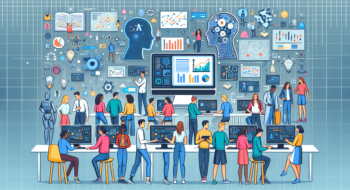The Impact of Generative AI on the 2024 US Presidential Election: A Double-Edged Sword
As the 2024 US presidential election approaches, the landscape of political campaigning and voter engagement is being significantly altered by the rapid advancement of generative artificial intelligence (AI). This technology, while offering numerous benefits, also poses substantial challenges that could influence the outcome of the election and the emotional well-being of voters.
The Rise of Generative AI in Politics
Generative AI has become a powerful tool in the political arena, allowing campaigns to create and distribute a vast array of content, from images and videos to audio clips and written texts. This technology has been in use for several months, with campaign ads featuring AI-generated images and audio already making an appearance.
The Potential for Misinformation and Disinformation
One of the most significant concerns surrounding generative AI is its potential to facilitate the mass creation and distribution of misinformation and disinformation. Experts warn that AI-generated deepfakes can be incredibly realistic, making it difficult for voters to distinguish between what is real and what is fabricated. This could lead to confusion and mistrust among voters, potentially impacting the integrity of the electoral process.
Examples of AI-Generated Content
The use of AI-generated content is not limited to serious political messages. Memes and humorous videos have also become popular tools for campaigns. For instance, a video featuring former President Donald Trump riding a feline while brandishing a firearm, or Vice President Kamala Harris sporting a mustache and dressed in communist garb, have circulated online. These memes, while often absurd, can still pose issues by reinforcing false or racially charged narratives.
Regulatory Challenges
The lack of clear federal regulations on the use of AI in political campaigns has left online platforms to construct their own policies. Companies like OpenAI and Google have implemented rules prohibiting the use of their platforms for political campaigning or requiring clear disclaimers on AI-generated ads. However, these policies are subject to change, and the absence of comprehensive federal guidance complicates the efforts to mitigate the negative impacts of AI-generated content.
Positive Uses of Generative AI
Despite the risks, generative AI also offers opportunities to enhance voter engagement and inform voters more effectively. For example, AI can be used to create conversational bots that provide accessible information about the political system and help voters understand where different parties stand on various issues. This could increase voter engagement and knowledge, making the electoral process more inclusive.
Global Implications
The impact of generative AI on elections is not limited to the United States. Campaigns around the world are adopting similar strategies, and the global consequences of these actions can be significant. Experts note that what happens in the US can influence election strategies in other countries, highlighting the need for international cooperation in regulating AI use in politics.
Tech Companies’ Response
In response to the growing concerns, twenty tech companies, including Microsoft, Google, and Meta, have signed a pledge to prevent their AI software from interfering in elections. This pledge includes developing tools to distinguish AI-generated content from authentic material and being transparent about notable developments. However, critics argue that these voluntary measures may not be enough to address the scale of the problem.
Emotional Impact on Voters
Given the potential for misinformation and the intense emotional investment voters have in presidential elections, it is plausible that some individuals might turn to generative AI as a way to cope with the outcome if their preferred candidate does not win. Here are a few ways this could manifest:
Creating Alternative Realities
Voters might use AI to create alternative scenarios or outcomes, providing a form of emotional comfort. For instance, AI-generated videos or images showing their preferred candidate winning could offer a temporary escape from the disappointment of a real-world loss.
Engaging in Satire and Humor
Generative AI can be used to create humorous content that mocks the election outcome, helping voters to laugh off their disappointment. This could include memes, satirical articles, or even AI-generated comedy sketches.
Seeking Information and Support
AI-powered chatbots could provide emotional support and information to voters, helping them understand the election results and offering resources for coping with disappointment.
Conclusion
The integration of generative AI into the 2024 US presidential election is a complex issue with both positive and negative implications. While it offers innovative ways to engage voters and inform them, it also poses significant risks related to misinformation and disinformation. As we navigate this new technological landscape, it is crucial to establish clear guidelines and regulations to ensure the integrity of the electoral process.
What’s Next?
The use of generative AI in elections is an evolving field, and its impact will continue to be felt beyond the 2024 US presidential election. Here are some key points to watch:
- Regulatory Developments: Expect ongoing discussions and potential legislative actions to regulate the use of AI in political campaigns.
- Technological Advancements: Companies will continue to develop new tools to distinguish AI-generated content from authentic material.
- Global Elections: The influence of generative AI will be observed in elections around the world, highlighting the need for international cooperation.
Stay Informed
To stay up-to-date with the latest developments on generative AI and its impact on elections, consider the following resources:
- Follow Tech News: Websites like NBC News and Emerging Tech Brew provide comprehensive coverage of the intersection of technology and politics.
- Expert Opinions: White papers and research from institutions like the University of Chicago Harris School of Public Policy and the Stanford Graduate School of Business offer in-depth analyses of the challenges and opportunities presented by generative AI.
Call to Action
Want to be in the loop about the latest news on generative AI and its role in elections? Subscribe to our Telegram channel for updates and insights: https://t.me/OraclePro_News. Stay informed, stay engaged.







